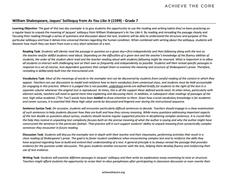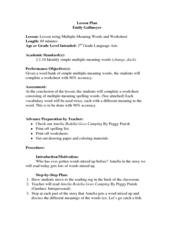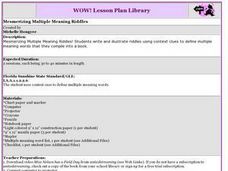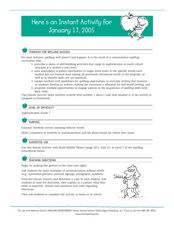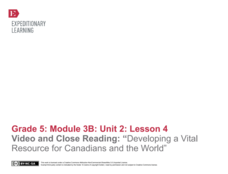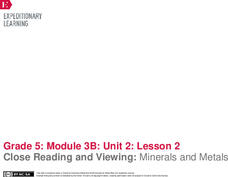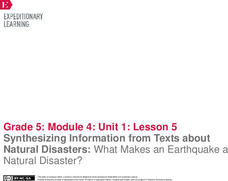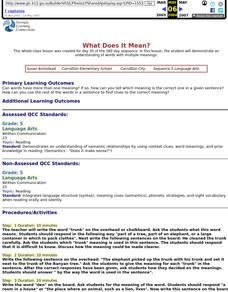Curated OER
More Than Words: Racism, Identity And the Power of Words
Students explore how words can be powerful instruments of racism, and discuss ways to combat racism, prejudice and discrimination in their own lives.
Curated OER
Lesson 56
Sixth graders practice Least Common Multiple in fractions. In this fraction lesson, 6th graders look at two different fractions and find a common denominator. They sing a song to memorize mean, median, and mode.
Curated OER
Math Words with Multiple Meanings
Learners of many ages use the Visual Thesaurus to help them understand the language of math. They work in groups to explore the multiple meanings of common math terms. Pupils come up with examples of the words in mathematical and other...
EngageNY
Relationships Between Key Scientific Concepts: What Causes Hurricanes?
A storm is brewing in the sea. Scholars complete multiple reads of How Does a Hurricane Form to determine gist, cause-and-effect relationships, and deepen vocabulary understanding. To finish, they complete graphic organizers to record...
Curated OER
"As You Like It" by William Shakespeare
Jacque's soliloquy from Act II, scene ii of As You Like It sets the stage for a close reading exercise that models how to approach difficult, dense text and enables readers to practice reading comprehension and analysis skills. Learners...
Curated OER
Using Multiple Meaning Words
Second graders explore multiple meaning words. In this language arts lesson plan, 2nd graders read "Amelia Bedelia Goes Camping." Students discuss the different meanings of the words in the story. Students complete a worksheet.
Curated OER
Mesmerizing Multiple Meaning Riddles
Students write and illustrate riddles using context clues to define multiple meaning words that they compile into a book. They read the book, Miss Nelson Has a Field Day, and observe the many different multiple meaning words used in the...
Curated OER
The Lion, the Witch, and the Wardrobe: Vocab Squares
Creatively develop and reinforce new vocabulary from the book, The Lion, the Witch, and the Wardrobe by C.S. Lewis, using these vocabulary squares. Each square is divided into four quadrants asking scholars to input the word, a picture,...
Curated OER
Sight Word Matching
Students explore English by participating in a match game. In this sight word vocabulary lesson, students read the book The Cat's Surprise and identify the sight words which they are unfamiliar with and need to review. Students identify...
Curated OER
Symbols Communicate Without Words
Students write different symbols we use in writing out in their word form. In this word symbols lesson plan, students practice writing out what the symbols represent. For example the symbol % stands for 'percent'.
EngageNY
Mid-Unit Assessment: Text-Dependent and Short Answer Questions: Excerpts from “A Limited Supply”
There's no such thing as an unlimited resource. Scholars complete a mid-unit assessment by reading A Limited
Supply. They answer text-dependent questions and complete a graphic organizer about key terms in the text.
EngageNY
Video and Close Reading: “Developing a Vital Resource for Canadians and the World”
Scholars watch Developing a Vital Resource for Canadians and the World to learn about the supplement potash that helps plants grow. They watch the video several times, completing a note catcher to record key ideas along the way. Pupils...
EngageNY
Close Reading and Viewing: Minerals and Metals
How easy is it to live off the land? Scholars read Minerals and Metals in Your Life and discuss how Canada's natural resources meet the needs of the people. Pupils watch a brief video and discuss the gist of the text and video. They then...
EngageNY
Synthesizing Information from Texts about Natural Disasters: What Makes an Earthquake a Natural Disaster?
Are all disasters natural? Scholars reread Earthquakes! to determine what classifies these events as a natural disaster. They label earthquake facts as N for natural or D disaster to support their ideas. They then discuss academic...
Curated OER
Beginning Synonyms and Antonyms-Multiple Choice-Adjectives
In this adjective worksheet using synonyms and antonyms, students are given 2 sets of words for which they choose the best synonyms, then antonyms for the respective word lists.
Curated OER
Beginning Synonyms and Antonyms-Multiple Choice-Nouns
In this synonym/antonym worksheet using nouns, learners are given one set of nouns and select the best synonym for each word. Next, students repeat the activity with a new set of words, selecting the best antonym.
Curated OER
Goldie Girl and There, Their, and They're: Homophones and Homographs
Instruct your class on homonyms and homophones. Learners take a pre-test and examine a list of homophones. They also play online word games to practice spelling and usage and write a fairy tale in which they use at least 10 homophones....
Curated OER
What Does It Mean?
Students demonstrate an understanding of words with multiple meanings. They give the meaning for each "trunk" in the sentence.
Curated OER
Estuary
Students discuss how the meanings of words can change over time. Through discussion, lecture, and activities, they identify how words can have multiple meanings and how those meanings can be changed over time. Lesson resources are...
Curated OER
Practice Spelling Plurals
Fourth graders review the rules for spelling plural nouns. In this plural nouns lesson plan, 4th graders review the six rules for making nouns plural. They apply the rules as they complete the associated worksheet.
Curated OER
Spelling Practice: ow and ou Words
Fifth graders complete activities for ou and ow words. In this ou/ow words activity, 5th graders practice ou and ow words by completing the 'instant activity.' Students complete a crossword puzzle activity for ou and ow words.
Curated OER
Instant Spelling Activity: Latin Roots
Eighth graders practice their spelling skills. In this Latin roots activity, 8th graders examine Latin roots. Students listen to a mini activity regarding Latin roots and then complete a worksheet. The worksheet is not included.
Curated OER
Multiplication: Bugs Can Multiply, So Can I!
Develop multiplication skills with your class. Youngsters will visualize multiplication as repeated addition. Then they will create a multiplication bug book and discover arrays as a strategy for multiplication problem solving....
EngageNY
Comparing Linear and Exponential Models Again
Making connections between a function, table, graph, and context is an essential skill in mathematics. Focused on comparing linear and exponential relationships in all these aspects, this resource equips pupils to recognize and interpret...






